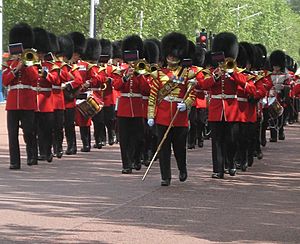March (music) facts for kids

A march is a type of music that has a strong, steady beat. It's often written to help people, especially soldiers, march in step. Even if a march isn't used for actual marching, it still has that clear, regular rhythm. Marches usually follow a 2/4 or 4/4 time signature, which means they have a steady "one-two, one-two" feel, like a left-right, left-right step.
Marches can be slow or fast. A slow march might be played at a funeral to show sadness.
Contents
Famous March Composers
Many composers have written famous marches. One of the most well-known is John Philip Sousa. He was an American composer often called "The March King." His marches, like The Stars and Stripes Forever, became incredibly popular around the world.
Marches in Classical Music
In classical music, many composers wrote marches that weren't meant for actual marching. Instead, they used the march rhythm to create a certain mood or feeling.
Sad Marches: Funeral Marches
Some famous examples of sad or "funeral" marches include:
- The second part of Beethoven's Eroica Symphony.
- The Marche funèbre (Funeral March) in Chopin's Piano Sonata in B flat minor.
- The Dead March in Handel's Saul, which is a type of musical story called an oratorio.
Marches in Operas and Ballets
Marches often appear in other types of classical music too. For example, Gustav Mahler often included marches in his long musical pieces called symphonies. You can also hear marches in operas, like Verdi's famous Aïda, or in ballets, such as Prokofiev's Romeo and Juliet.
Instruments in March Music
Music written for marching often uses instruments that soldiers play in marching bands. These include loud brass instruments like trumpets and trombones, woodwind instruments such as the fife, and drums like the snare drum and bass drum. When classical composers write marches, they often try to make their music sound like a military band by using these same kinds of instruments.
Marches for Special Events
March music is also composed for important ceremonial occasions. For example, marches are often played during coronations, which are ceremonies where a new king or queen is crowned. Famous British composers like Edward Elgar and William Walton both wrote special march music for coronations.
Images for kids
-
The Band of the Welsh Guards of the British Army play as Grenadier guardsmen march from Buckingham Palace to Wellington Barracks after the Changing Of The Guard.
See also
 In Spanish: Marcha para niños
In Spanish: Marcha para niños
 | Frances Mary Albrier |
 | Whitney Young |
 | Muhammad Ali |



